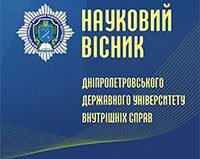Oleksandra Nestertsova-Sobakar
Nestertsova-Sobakar O. (2022), On the question of legality and capacity of the parties and attorneys according to the statute of civil proceedings of 1864, Scientific Bulletin of Dnipropetrovsk State University of Internal Affairs, №4, 89-94
DOI: 10.31733/2078-3566-2022-4-89-94
ABSTRACT. The study examines the provisions of the Statute of Civil Procedure of 1864 on the peculiarities of the parties in civil proceedings, namely the requirements and restrictions on participation, as well as rules relating to the activities of attorneys and jurors in magistrates’ courts and district courts as representatives of one of the parties. It is determined that the Statute of Civil Procedure was adopted during the crisis in the judicial system as a whole, and this act was one of four that laid the foundations for a new judicial reform in the context of large-scale reform that took place in the state during the 1860s and 1870s in the russian empire. It is noted that the Statute contained many new progressive principles, which were borrowed from the best European acts of civil procedural law.
Unlike the acts that previously defined civil proceedings, the Statute of Civil Procedure provided that everyone was recognized as having the right to be a plaintiff in a civil lawsuit, as well as to be a defendant. However, there were a number of conditions for persons who were deprived of legal capacity or capacity to be a defendant or plaintiff in civil proceedings in magistrates’ courts. Persons deprived of their legal status were deprived of legal capacity, and representatives of their interests acted in matters of legal capacity for minors or persons under guardianship. It is emphasized that as a result of the development of capitalism, the Charter regulated the issues of representation of business entities in the courts as a party to civil proceedings. Analyze the provisions of the Statute on the conditions that deprived a person of the right to become a lawyer in magistrates’ courts and district courts. It is noted that some restrictions on the right to be a lawyer apply to persons who have committed serious immoral offenses or have a conflict of interest or a likelihood of corruption due to the bankruptcy of a person.
Keywords: jurors, lawyers, requirements, restrictions, judicial reform, bankruptcies, Ukraine, russian empire.
References:
- Kovalyshyn, O. R. (2017) Osoblyvosti tsyvilnoho protsesu za Statutom tsyvilnoho sudochynstva 1864 roku [Peculiarities of the civil process according to the Statute of Civil Procedure of 1864]. Aktualni problemy vdoskonalennia chynnoho zakonodavstva Ukrainy. Issue 45, pp. 166–175. [in Ukr.].
- Shandra, V. S. Sudova reforma 1864 [Judicial reform of 1864]. URL: http://www.history.org.ua/?termin=Sudova_reforma_1864. [in Ukr.].
- Skuratovych, I. M. (2010) Deyaki aspekty znachennia dosvidu sudovoi reformy 1864 r. dlia stvorennia demokratychnoi sudovoi vlady v Ukraini [Some aspects of the significance of the judicial reform experience of 1864 for the creation of a democratic judiciary in Ukraine]. Forum prava. № 3. рр. 409–414. [in Ukr.].
- Pashuk, A. (1967) Sud i sudochynstvo na Livoberezhnii Ukraini v XVII–XVIII st. (1648–1782) [Court and judiciary in Left Bank Ukraine in the XVII–XVIII centuries. (1648–1782)]. Lviv : Vydvo Lviv. un-u, 180 p. [in Ukr.].
- Levchuk, Yu. M. (2018) Kyivska sudova palata v derzhavnomu mekhanizmi Rosiiskoi imperii (1880–1917): istoryko-pravove doslidzhennia [The Kyiv Judicial Chamber in the State Mechanism of the Russian Empire (1880–1917): Historical and Legal Research] : dys. … kand. yuryd. nauk : 12.00.01 / Kharkiv. nats. un-t im. V. N. Karazina. Kharkiv, 218 p. [in Ukr.].
- Semeniuk, I. Ya. (2016) Moralni zasady diialnosti instytutu advokatury: teoretyko-pravovyi aspect [Moral principles of activity of the institute of advocacy: theoretical and legal aspect] : dys. … kand. yuryd. nauk : 12.00.01 / Lviv. derzh. un-t vnutr. sprav. Lviv, 240 p. [in Ukr.].
